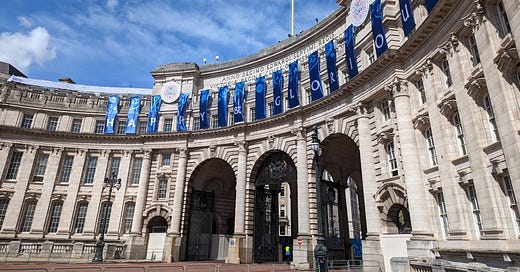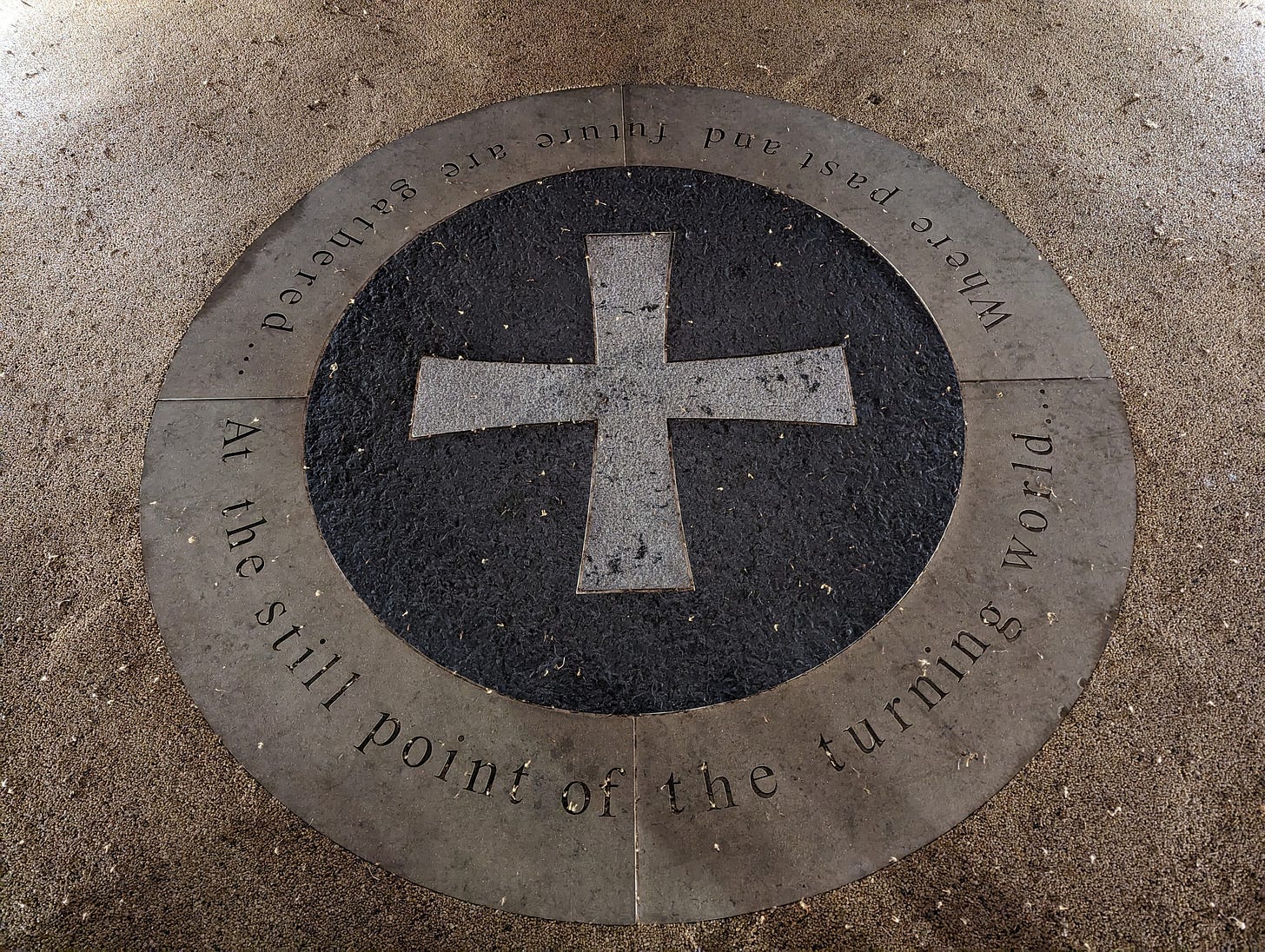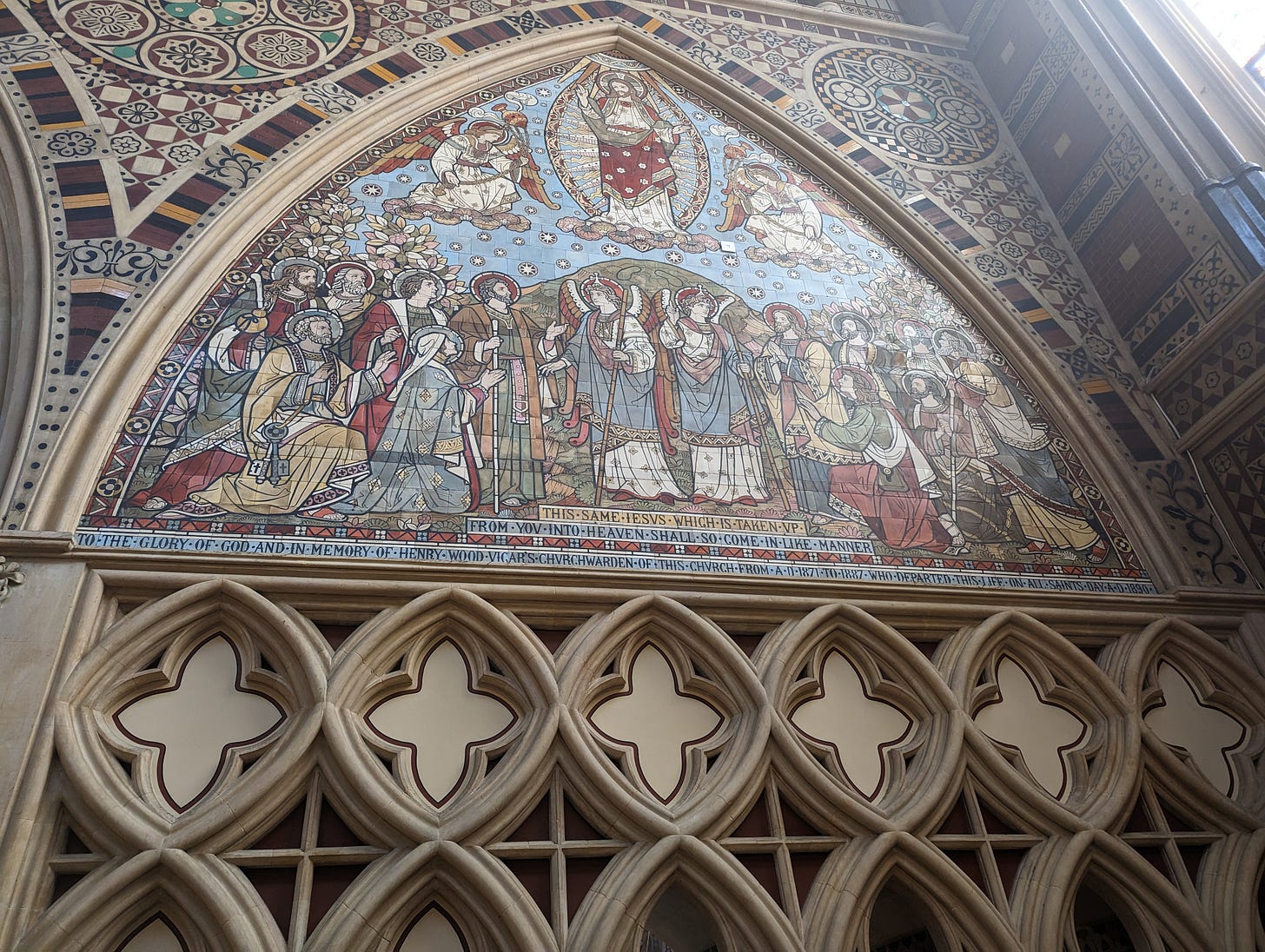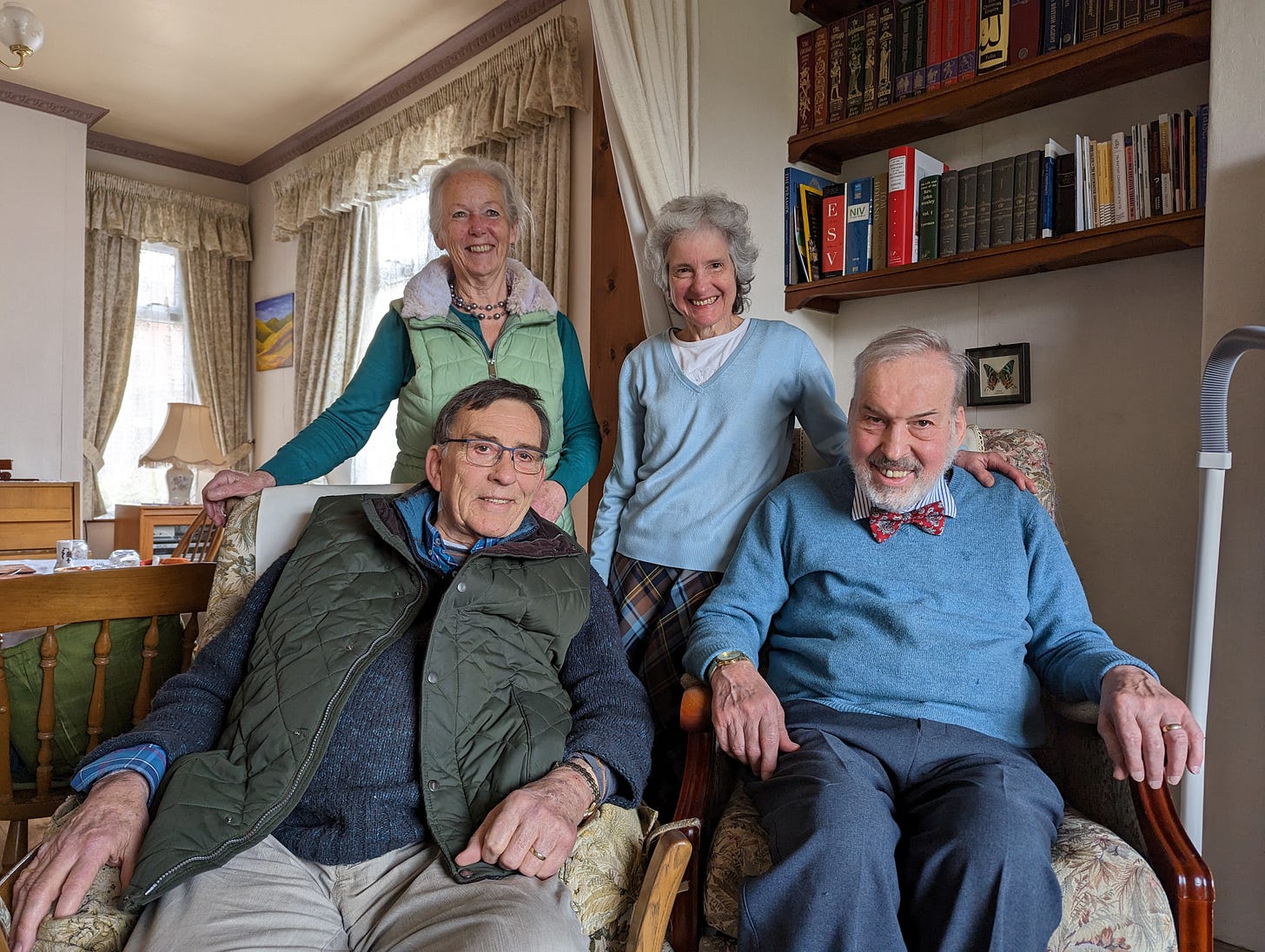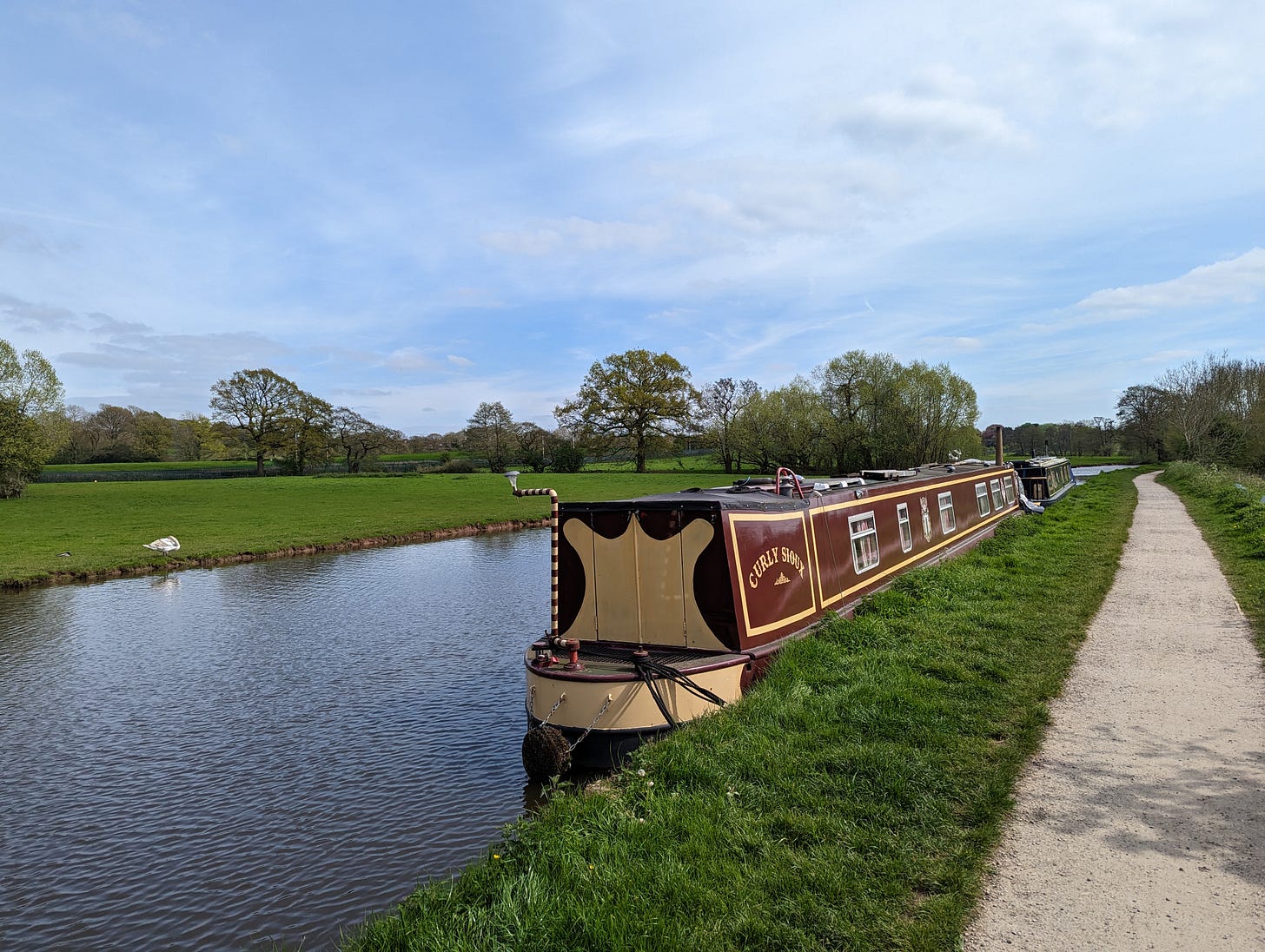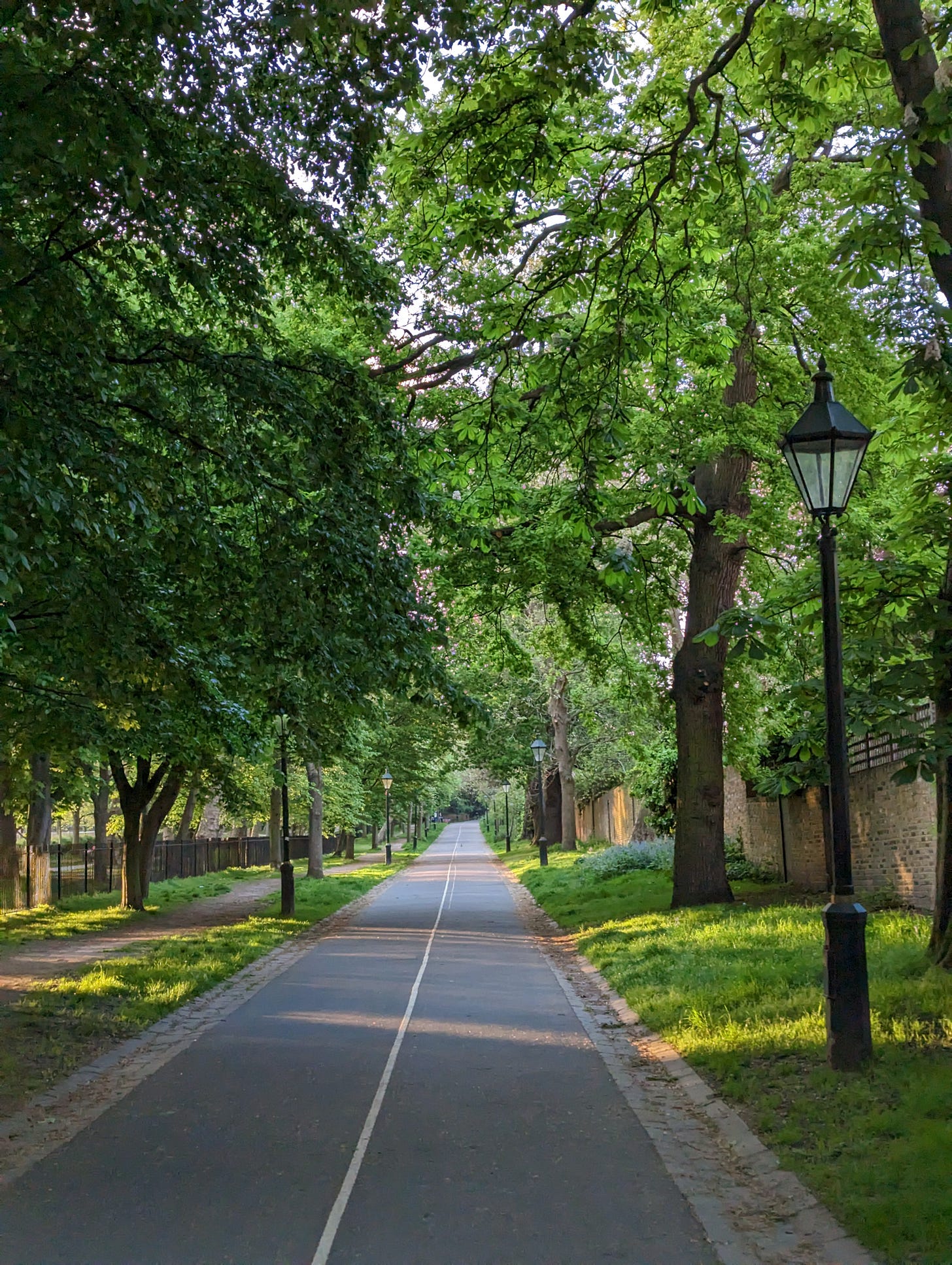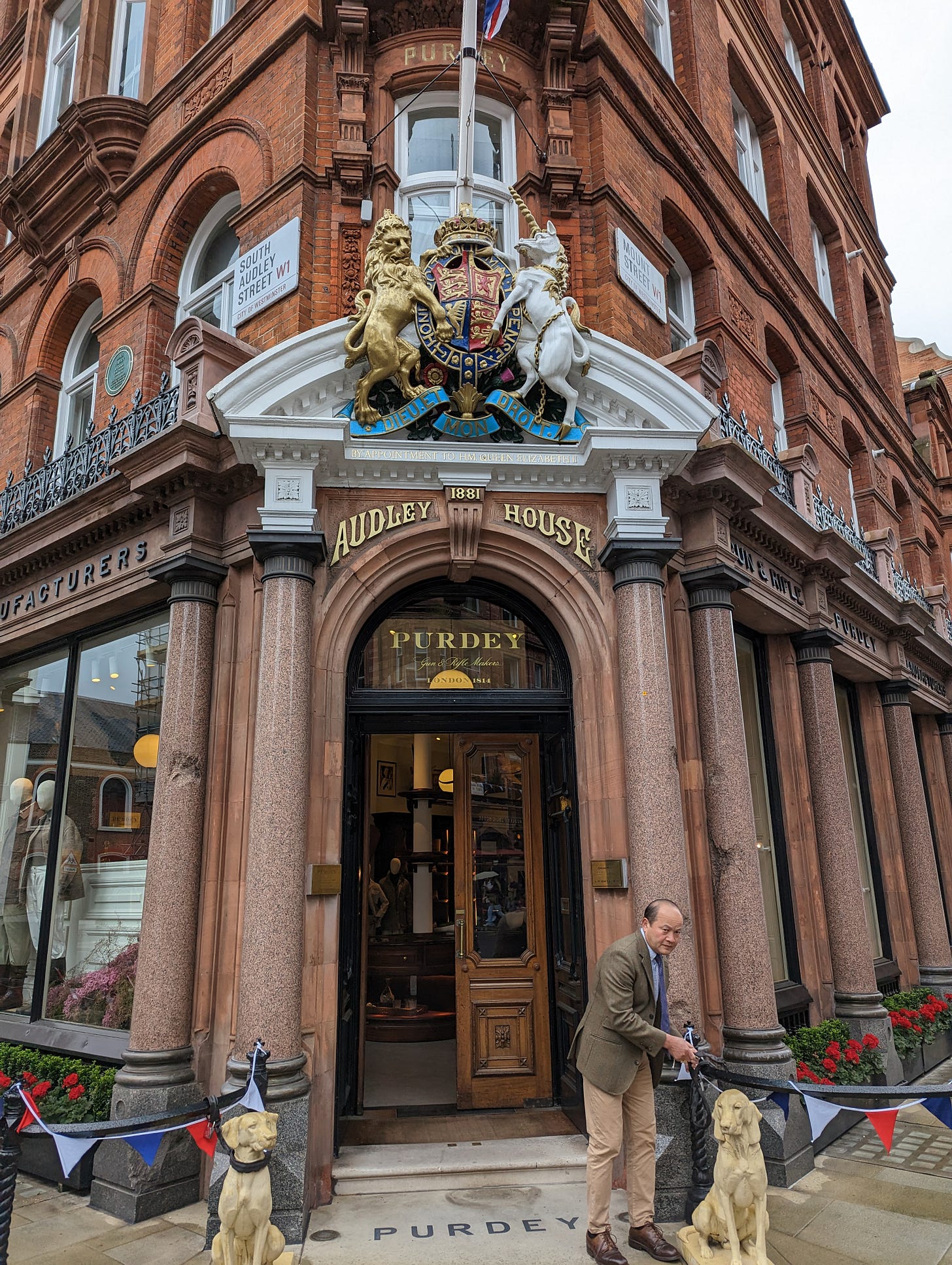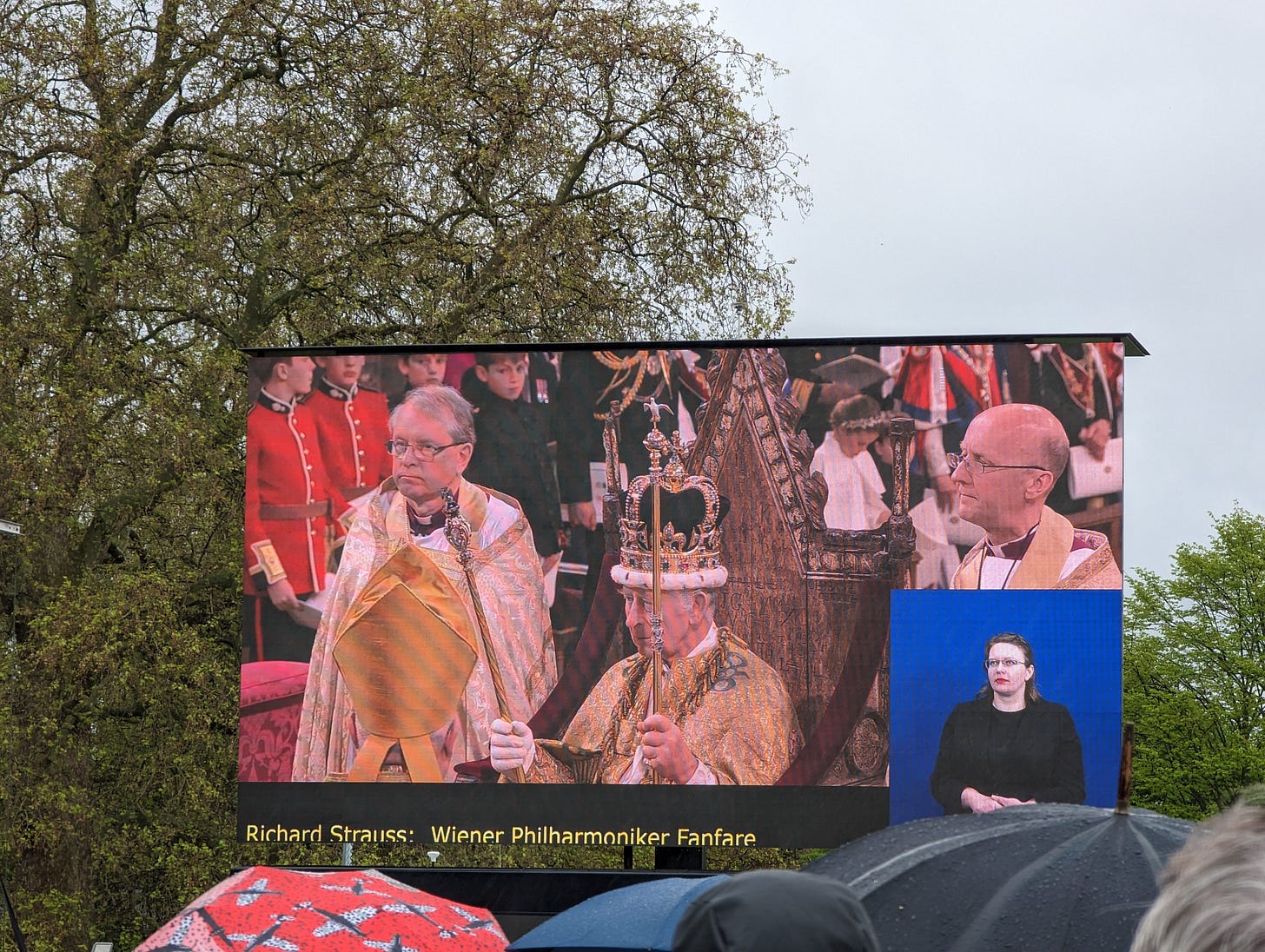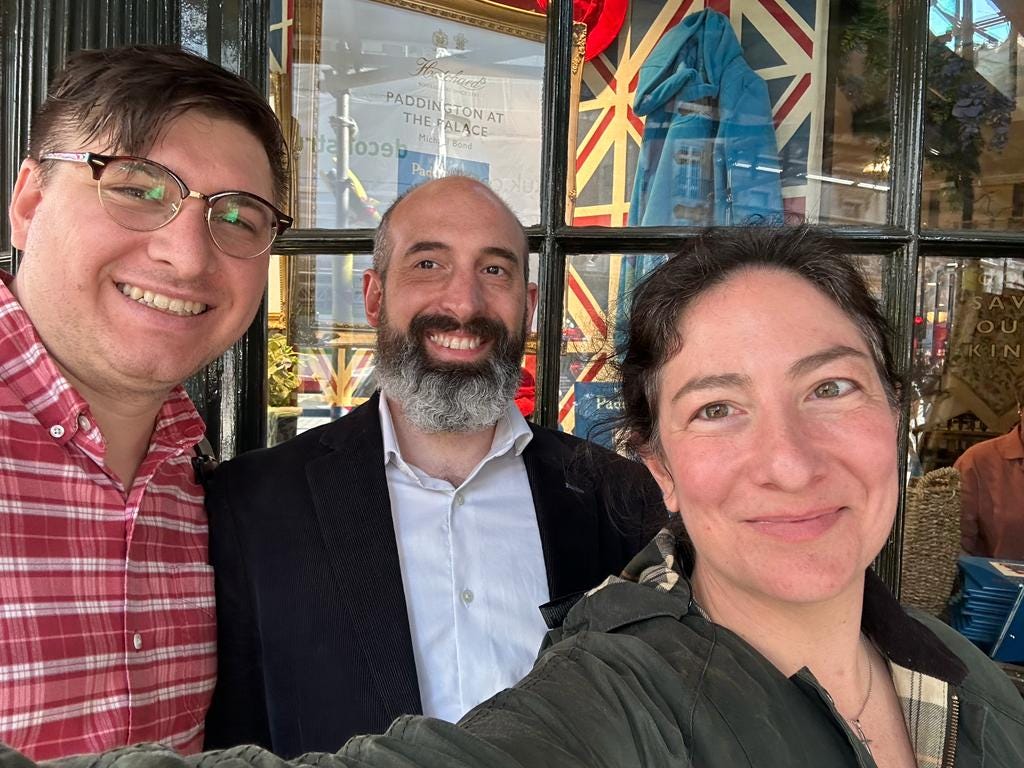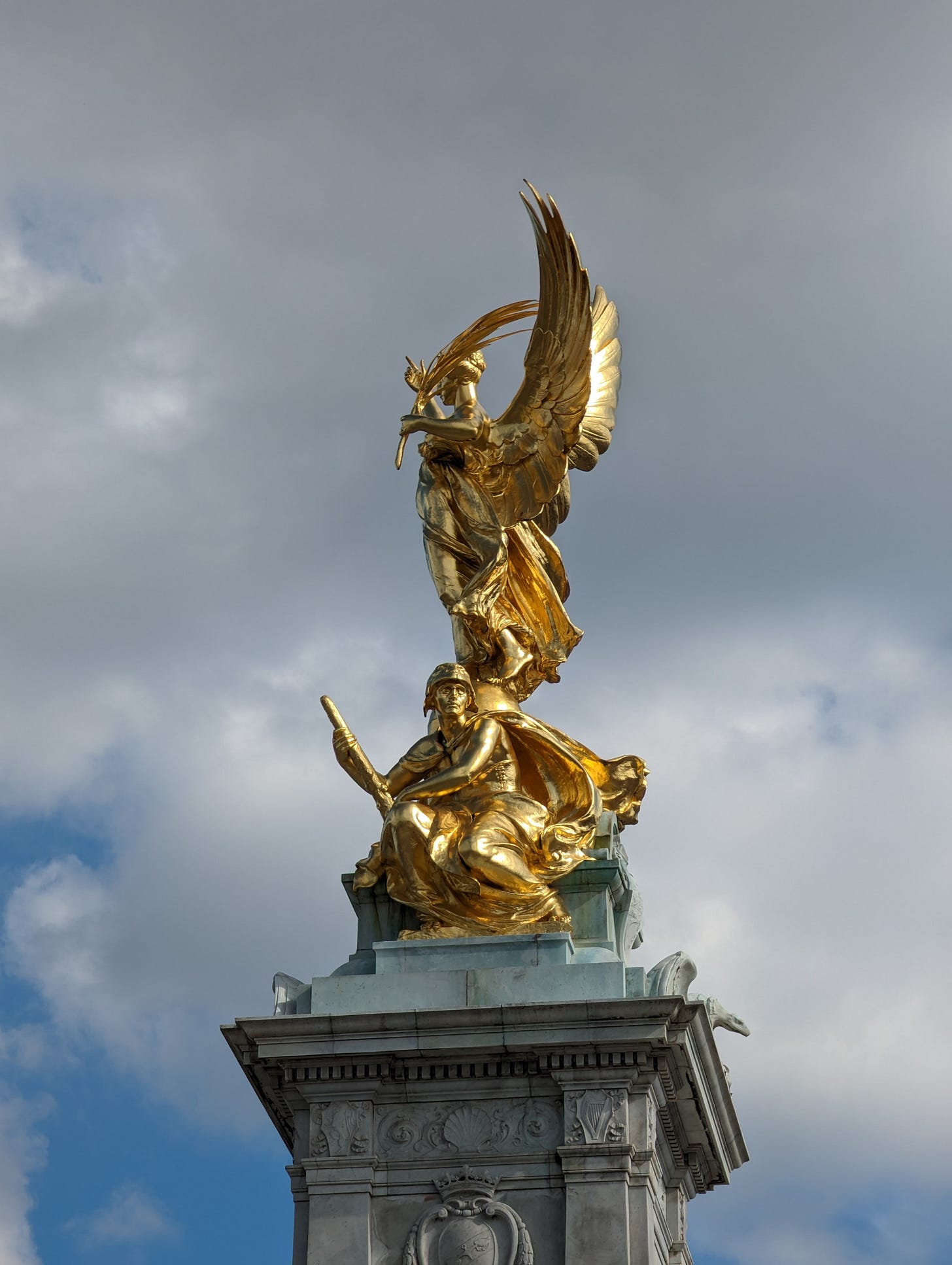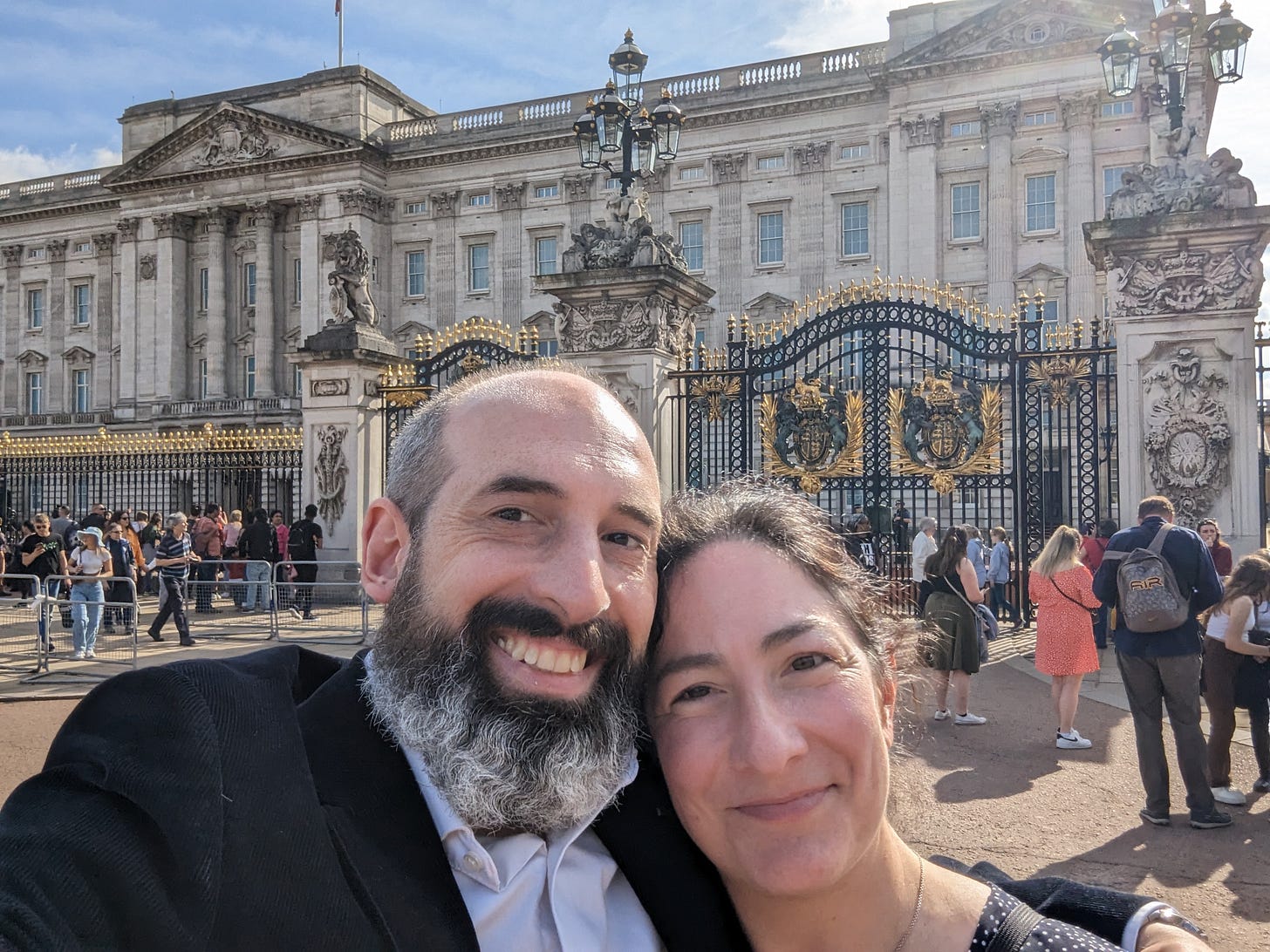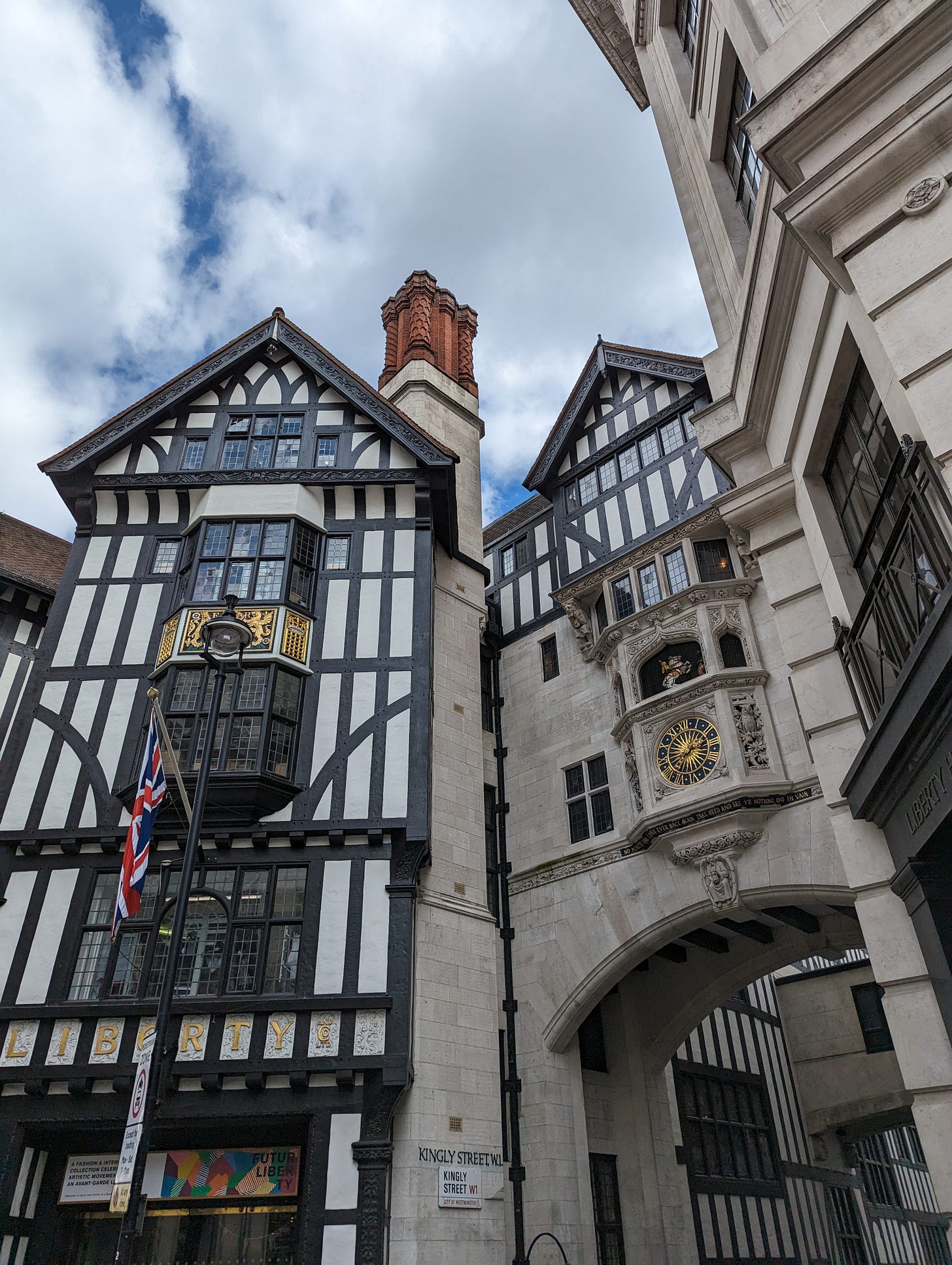Dear all,
Susannah: This time last week we had just arrived at a festive coronation dinner at a favorite restaurant in South Kensington. We were meeting up with a group of a dozen or so friends to toast His Majesty, after we’d watched the coronation on one of the big screens set up in Hyde Park.
It was an incredibly moving service - go here if you missed it, and go here for the order of service to follow along - and also profoundly disconcerting, in a good way: with all the discussion of Christian nationalism in the United States, this was a very distinctly Christian ceremony of political legitimacy of a nation of people of many faiths, a ceremony with no sense of the partisanship or resentment that so much of the Christian nationalism discourse can carry in the States. The monarchy is a Christian institution; there is no sense, though, that Christians are an “interest group” within the country to whom the King is particularly beholden. He is truly the King of all people in his realms, and the impossibility of his taking the side of one subject against another, of “belonging” to one set of subjects more than another, is one of the ways that the monarchy seems to be able to subvert the kind of bitter political battles that are so pronounced in the US.
The major change to the coronation service between Queen Elizabeth’s coronation and King Charles’ was that while in all previous coronations, going back to that of King Edgar in 973, homage was done to the newly-invested monarch by the peers only, every subject of His Majesty was invited to do homage. The Archbishop of Canterbury called upon all his majesty’s subjects who desired to “to make their homage, in heart and voice, to their undoubted King, defender of all.”
The oath, which Alastair took, was as follows: I swear that I will pay true allegiance to Your Majesty, and to your heirs and successors according to law. So help me God.
It followed in the order of service the Homage of Royal Blood, the oath of fealty that Prince William took: I, William, Prince of Wales, pledge my loyalty to you and faith and truth I will bear unto you, as your liege man of life and limb. So help me God.
The media reaction to this change was fascinating. It was read almost entirely backwards, even by those who reported correctly that this was voluntary. There was much outrage. In fact, it was in a sense a populist gesture, inviting all subjects to come into the relationship with the King which only the peers of the realm, had been in in previous reigns. In other words, every one of the King’s subjects was offered the chance to come into the specific feudal relationship with his Majesty that had previously been the purview of the aristocracy.
I’m entirely convinced that due to lack of general understanding of vassalage and the political implications of the oath, and the general excitability of the crowd on the Mall and in the parks, quite a number of visiting American tourists ended up as accidental liegemen of His Majesty. If, as I suspect, this was the result of some kind of very long game, a massive soft-power psyop to reclaim huge numbers of erstwhile colonists for the Crown, I can only say it went off without a hitch.
In any case, as I find in refreshing my knowledge of English feudal obligations by googling, King Charles now has the obligation to protect Alastair both militarily from incursion and judicially via court justice. Meanwhile Alastair owes His Majesty service falling into four general categories, which I summarize below:
Military (auxilium). This includes personal service on the field of battle and, where appropriate, the raising of troops. This is known as fyrd-bote, fyrd being a word for militia. He may also be called on to work on military fortifications (burgh-bote), or on repairing bridges and roads (bridge-bote.) These three make up the so-called “trinoda necessitas,” or three-knotted obligation.
Court duties (consilium). This may encompass anything from personal security (being a guard at court) through rendering advice in council.
Special taxes (aids). These will cover things like ransom, if needed, or expenses incurred in events such as royal marriages.
Incidents, which may include a thank-you gift if King Charles ever grants Alastair a fief; the duty to feed and house him and his retinue when he visits (known as Droit de gîte), and allowing the King to hunt or fish on his land (or Droit de garenne.)
Right, well, that’s probably not entirely how this all will play out in a modern monarchy, but one does like to know what one is getting into, at least hypothetically. It is also a salutary reminder that the “normal world” of secular liberal democracy is an extremely thin smear of frosting over a rich and dense cake of political and religious reality.
The Two-Sided Coronation of Jesus
Alastair: Have we mentioned that we are writing a book on coronation, monarchy, sovereignty, and the Christian political imagination with John and Alison Milbank and Robin Ward? It will now be published by Wipf and Stock and we are extremely excited about it.
Among other things, my essay in the book meditates upon the fact that the entire New Testament can not unreasonably be read as an account of and exposition of the ‘coronation’ of Jesus. However, this crowning of Jesus with glory and honour is of a remarkable kind. It unites supposed contraries.
In his Transfiguration, Jesus ascended a mount, where his kingly majesty was displayed in dazzling brilliance, his face shining like the sun and his clothes radiant with glory, a voice from a bright cloud declaring his royal authority as the divine Son, and Elijah and Moses appearing with him. On the mount of Calvary, Jesus was stripped of his clothing, his face disfigured, crowned with thorns, the sun darkened in the heavens, a mocking inscription above him declared him to be the King of the Jews, and he was flanked by two criminals.
Calvary and the Mount of Transfiguration are each other’s revelatory obverse: neither can truly be understood without the other.
Psalm-Singing and Our Encounter with Scripture
On account of the Psalm Roar in Shrewsbury, psalm-singing has been at the forefront my mind. I shared some thoughts on the Psalms and psalm-singing in my talk at the event, but many further things occurred to me during the event and afterwards.
Christians can easily think of Scripture as a collection of texts containing moral precepts, doctrinal instruction, historical information, random devotional nuggets, and other such things. Scripture is imagined principally as inert words on a page whose informational content needs to be extracted by the mind of the reader—in an activity typically termed ‘interpretation’. Indeed, some might be surprised by the implication that there might be other ways to think of it. This can function as a set of constraining expectations, greatly limiting our engagement with it.
A frequent consequence of such an approach to the scriptural text is inattention to, or even disregard for, the form of Scripture. Believing that some supposed doctrinal, ethical, or devotional content is thoroughly extricable from the form of Scripture, the degree to which the revelatory end of Scripture is achieved through literary structure, artistry, and rhetoric, for instance, or through ‘scripted’ forms of engagement, can be missed. For any who regard them chiefly as containers or vehicles of meaning to be extricated, the notion that much of their meaning is discovered through attention to the form of scriptural texts and submission to their direction can be strange and disorienting. In such cases one often won’t encounter strong resistance to alternative postures towards the text, mostly because their possibility hasn’t really been considered.
When a reader is narrowly concerned to discover and abstract the all-important propositional theological content of a scriptural text, they can easily lose sight of the text as a specific form of speech act and the significance of that. The form of the Scripture can be regarded as if it were a disposable husk containing a theological kernel for the detached mind, rather than as a means of directing the hearer or reader’s meditations upon or internalization of the text, a means of conscripting and forming—not merely informing—its addressees, or as the scripting of authorized performances. This posture towards the Scripture can also render it inert for us, as we have subconsciously filtered out all the activity implied in its form.
The book of Psalms is a good example to consider here. The psalms don’t primarily inform us of doctrine. Although they can be powerfully formative of ethics, they do not principally instruct us in ethical ideas. And, while they contain a great deal of a devotional nature, much of this doesn’t really fit many Christian’s expectations of devotional material, expectations which remain strongly didactic in character.
Psalms, for instance, are not helpfully considered as ‘containers’ of moral or doctrinal truth. Such a way of imagining texts tends to spatialize them, to treat them as if they were objects that belonged in the immediacy and ‘present’ of the mind’s speculation, in a largely timeless space. However, psalms are principally written to be sung in the assembly, something that takes time (and practice). And that time is frequently integral to their meaning. To understand a piece of music, you can’t merely quickly read the score, you must listen to—or better, perform—it, submitting your attention to its playing out over time. Many psalms narrate a movement of the heart and mind, in which the singer is invited to participate. The psalmist commonly ends up in a different state of soul at the end than he was in at the beginning of the psalm, and his words can lead the worshiper into a similar journey of the soul. Rather than containers of truths to be extricated and held in the atemporal immediacy of some internal realm of thought, psalms are chiefly external and collective performed texts, whose movements we are both called to enter and to take into ourselves, being formed by them.
Our ways of conceiving of Scripture can also dull us to it as something to be treasured and repeatedly performed. This is likely in part a consequence of the printed word, mass production of texts, and the weakening of many habits characteristic of oral society. Our Bibles are not physically valuable objects and, as printed texts of Scripture are readily available to us, practices of memory, meditation, and public reading are greatly diminished.
Learning and singing the Psalms can greatly deepen our sense of God’s Word’s relationship to us. The Psalms are presented to us as means of the indwelling of Christ’s word (Colossians 3:16) and of his Spirit’s indwelling (Ephesians 5:18-21). They are means of knitting bodies of God’s people together in common song.
The Psalms are largely divinely inspired speech for us, much of them first-person in character. God is not merely speaking to us, but giving us words to express to him and to each other. The words aren’t chiefly about informing minds, but about conscripting hearts and inscribing his Word upon them, and placing it upon our lips. The force of this shouldn’t be missed. The psalmist speaks of the word of the Lord as sweet like honey to his taste (19:10; 119:103), as stored up in his heart (119:11), and as his meditation all the day (119:97). The promise of the new covenant is the law of the Lord placed in our hearts (Jeremiah 31:33). The psalmists describe this experience from the very opening psalm—“his delight is in the law of the Lord, and on his law he meditates day and night” (Psalm 1:2). This is such a fitting beginning to the Psalms, because the law in the renewed heart is revealed by the words of the lips, and the rest of book gives us wonderful words in which we can delight and grow. “He put a new song in my mouth, a song of praise to our God” (Psalm 40:3). New covenant hearts will be hearts filled and overflowing with psalms.
Singing the Psalms teaches us to delight in God’s words. God’s words are not merely disposable containers for ideas, information, and directives, but glorious things to be savoured, expressed beautifully, borne in memory, and treasured within in the deep meditations of the heart. In singing the Psalms, we take inspired words of the Spirit as our words, recognizing also that the words are ultimately of Christ and that he leads us as we sing. We sing back to God the words that he has given to us, seeking to do so in a way that manifests our close attention to and internalization and treasuring of them. And in singing psalms back to God, we join with the assembly, taking God’s words and glorifying them with our music and mouths, our musical composition and performance a form of loving attention to God’s gift of such voice to us as his children, that gift redounded to his glory.
Too often, modern worshipers treat worship as if it were something chiefly to be consumed by them as individuals (leading to a great concern that church music styles cater to their more general tastes in music consumption). Yet worship is not chiefly to be consumed quasi-passively, but to be an act. In the purposeful and practiced act of singing psalms together, we joyfully and lovingly present our hearts and our assemblies to God and we take his Word into us. Because it is an act of worship, we should want to take time to learn how to do it well. Typically greater delight will follow.
A huge obstacle to good psalm-singing is the ingrained passivity that comes with a lifetime of being consumers of music. Great psalm-singing is entirely achievable, but we must approach worship more as an act of making music before the Lord, demanding practice and effort.
Indeed, the more the Church’s music is driven by the musical tastes of religious consumers, the more divided it will be. The corporate act of making music has a power to unite that exceeds the unity produced by the convergence of private tastes in its consumption. Congregational psalm-singing is a form of expression of God’s Word by which, within the body of Christ, we address each other and by which Christ’s word and his Spirit indwell us (Colossians 3:16; Ephesians 5:18-21). As we do it, the body can become self-aware in a new way. As we don’t merely sing along with performers at the front, but sing in unison or in harmony as a congregation, we take fuller ownership of the words that God has given us as our own joyful and purposeful expression and also receive those words from the lips of our neighbours. Along with responsive liturgy, psalm-singing as a congregation’s service of the Lord and ministry to each other is a powerful way to practice, amplify, and develop the voice of the laity. The loss of this voice might be one reason we get so fixated on those speaking at the front.
There are great hymns, but only the psalms are the very words of God, to store up in memory and treasure within, to give ready channel to the expression of full hearts, to unite us with our neighbours in song, and to gather the people of God for over 3,000 years in common praise. I suspect much resistance to psalm-singing arises from the impression it is dull and dour and its advocates legalistic and joyless. However, seeing many different ways it can be done well, the question is not whether we have to sing psalms, but whyever we wouldn’t want to!
[The Theopolis Institute’s work on the Psalter was recently mentioned in a Wall Street Journal article: “The Theopolis Institute is producing a Psalter with new chant settings of all 150 psalms. Expressly written for untrained singers—i.e., most of us—this new psalter is intended to renew the chanting of psalms as a central element of Reformed worship.”]
Recent Work
Alastair
❧ Matt and I discussed the Nicene Creed with Dr Phillip Cary, who has recently written an introductory book on the subject. Joshua Ryan Butler has been at the centre of controversy concerning his recent book, Beautiful Union. He joined Matt, Andrew, and me for a conversation about his book, the vision he was trying to convey within it, and the controversy arising from it.
❧ The Theopolis Podcast series on Deuteronomy continues, with episodes on 4:1-43, 4:32-49, and 4:41—5:21. We get into real depth on these chapters, with some of the longest episodes we have ever produced.
❧ I have returned to the God’s Story Podcast for a series on the book of Revelation. The first two episodes have now been posted: Revelation 1 (Part 1) and Revelation 1 (Part 2). I give some more general thoughts on the book of Revelation and discuss its opening vision.
❧ I spoke on the Friday evening of the Psalm Roar in Shrewsbury, about the book of Psalms and the value of singing them.
Happenings and Doings
We have had a delightfully packed last few weeks. Shortly after our last Substack post, Alastair joined Tim Vasby-Burnie and about one hundred others for a ‘Psalm Roar’ in St George’s Church in Shrewsbury. Alastair gave a talk on the subject of the Psalms and psalm-singing on the Friday evening and the group spent the day on Saturday singing a variety of psalms, metrical, through-composed, four-part, chanted, etc. It was quite a powerful experience.
As we are both very busy and Alastair’s father, Phil, now has very limited energy levels, we have sought opportunities to spend periods of special time with him and Alastair’s mother, Joy. Alastair’s uncle and aunt, Phil’s brother and sister-in-law, visited a few weeks ago, and we were able to spend a brief time with them. We had a wonderful outing to Rudyard Lake (after which Rudyard Kipling was named), the first time Susannah had visited it. We have been making the most of the great English tradition of afternoon tea; besides inviting Phil and Joy over for afternoon tea one day, we also cycled out to the Wedgwood factory for afternoon tea there.
(Susannah: Alastair has failed to mention that in cycling to Wedgwood along the canal, I got lost. Cycling along a canal. Which is, as is the way of canals, shaped like a straight line. I don’t want to talk about it.)
The great highlight of the past few weeks was going down to London for the coronation. Friday was glorious. We met up with some friends from Tyndale House in Cambridge, who had been camped out on the Mall for a day already, waiting for the event on Saturday. There was a wonderful expectant atmosphere throughout the city. We also met up with a friend in the evening for a meal.
The weather on the day of the coronation was damp, although it noticeably improved at the end of the service and the beginning of the great procession from the Abbey. We watched the ceremony on one of the big screens in Hyde Park, along with hundreds of others. It was a powerful and moving experience, especially being able to share it with so many others. We passed a wonderful afternoon in London, visiting Fortnum and Mason and several other locations and stores before an evening dinner with several friends and co-conspirators.
After church on Sunday, we met up with an American friend who was in the city and made the most of a sunny day, visiting Buckingham Palace and also enjoying afternoon tea at one of our favourite restaurants.
Upcoming Events
❧ We return to the US next week!
❧ Alastair will be back at Davenant Hall to teach the summer program in June.
❧ Most of Alastair’s work is as an independent scholar, funded by Patreon donors. His primary goal is to create thoughtful yet free Christian material for the general public, most notably his largely-completed chapter-by-chapter commentary on the whole Bible (available here and here). If you would like to support his continuing research, teaching, writing, and other content production, you can do so here.
Much love,
Susannah and Alastair

